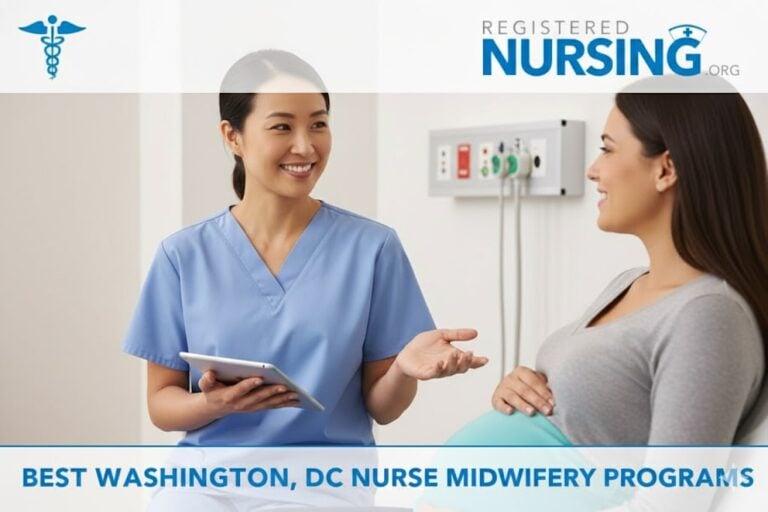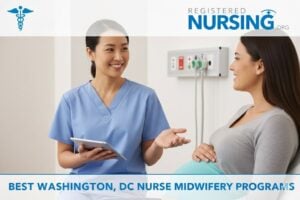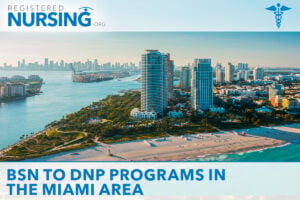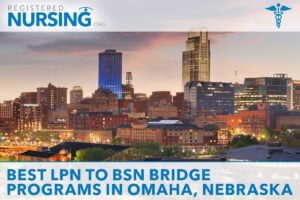Best Washington, DC Nurse Midwifery Programs
- 2026 Best Nurse Midwifery Programs Near Washington, DC
- Why Washington, DC Is a Strong Midwifery Hub
- Admissions Overview: What DC-Area Programs Typically Require
- CNM Curriculum & Coursework: What You'll Study
- Clinical Training in the DMV: Examples & How It Works
- What to Evaluate in a DC-Area Midwifery Program
- Licensure, Certification & Practice in DC/MD/VA
- Cost, Funding & Work-Life Balance
- Career Pathways & Employers in the Capital Region
- How to Strengthen Your Application (DC Edition)
- FAQs
- Latest Articles & Guides

If you want to practice as a Certified Nurse-Midwife (CNM) in the nation's capital, you're in the right region. Washington, DC and the surrounding DMV (DC–Maryland–Virginia) offer rich clinical sites, from academic medical centers to FQHCs and community birth centers, plus a strong job market for CNMs in hospitals, birth centers, and integrated OB/GYN practices.
In this article, you'll learn:
- What to expect from nurse midwifery program curricula (didactic + simulation + clinical).
- Typical admissions requirements and how to strengthen your application in the DC market.
- Local clinical rotation examples and where CNMs work in the DMV after graduation.
- Licensure & certification basics for DC, Maryland, and Virginia.
- Cost, aid, and work-life balance tips for metro DC students.
- A quick comparison table to evaluate programs at a glance.
2026 Best Nurse Midwifery Programs Near Washington, DC
Georgetown University
Washington, DC - Private 4-year - georgetown.edu
Master's - Nurse-Midwifery/Women’s Health Nurse Practitioner
Online Learning - Visit Website
Georgetown University's online Nurse-Midwifery/Women's Health Nurse Practitioner program prepares advanced practice nurses to provide comprehensive healthcare across the lifespan. Students develop expertise in reproductive health, sexual care, family planning, and newborn care through a 27-month, 49-credit curriculum. The program emphasizes health equity, trauma-informed care, and cultural responsiveness. Graduates become certified nurse-midwives and women's health nurse practitioners, eligible to take professional certification exams. Admission requires a BSN, RN license, and minimum 3.0 GPA.
- Online distance-based master's program
- 49 total credit hours
- 27 months to complete
- 1,000+ clinical hours
- Two required clinical intensives
- Jesuit-inspired holistic care approach
- Health equity curriculum focus
- Eligible for CNM and WHNP certification
- Minimum 3.0 GPA required
Doctorate - DNP Dual Nurse-Midwifery/Women’s Health Nurse Practitioner (NM/WHNP)
Online Learning - Visit Website
Georgetown University's DNP Dual Nurse-Midwifery/Women's Health Nurse Practitioner program provides advanced nursing professionals with comprehensive training to deliver high-quality women's healthcare. This rigorous online program prepares registered nurses to provide primary and specialized care for women throughout their lifespan, emphasizing leadership, evidence-based practice, and holistic patient care. Students complete 74 credits and 1,100 clinical hours, gaining expertise in gynecological, obstetrical, and midwifery services while developing advanced practice skills.
- Online DNP dual specialization
- 74 total credit hours
- 1,100 total clinical hours
- Full-time or part-time options
- Eight 15-week academic terms
- Three clinical intensives
- Board certification preparation
- ACME fully accredited program
George Washington University
Washington, DC - Private 4-year - gwu.edu
Master's - Master of Science in Nursing in the Field of Nurse-Midwifery
Online & Campus Based - Visit Website
George Washington University's Master of Science in Nursing offers a comprehensive nurse-midwifery program preparing advanced practice nurses for women's health care. The rigorous curriculum integrates research, clinical practice, and comprehensive women's healthcare across the life span. Students gain extensive clinical experience through 840 clinical hours, learning to provide primary care, gynecologic services, and comprehensive pregnancy and birth support. Graduates are eligible for national certification through the American Midwifery Certification Board. The program requires a bachelor's degree in nursing, an active RN license, and maintains a preferred minimum 3.0 GPA for admission.
- 50 total credit program
- 840 clinical training hours
- AMCB certification preparation
- ACME fully accredited program
- Women's health focus
- Hybrid program format
- Bachelor's nursing degree required
- Minimum 3.0 GPA preferred
- Two recommendation letters needed
- Active unencumbered RN license
Why Washington, DC Is a Strong Midwifery Hub
The DC metro area blends top-tier hospitals, high-volume OB services, and community health systems that value patient-centered maternity care. The region also supports a full spectrum of birth settings, including hospitals, birth centers, and homes, giving students broad exposure during clinical rotations and graduates multiple employment pathways.
Examples of practice and rotation environments include:
- Academic & Tertiary Hospitals (District): George Washington University Hospital; MedStar Washington Hospital Center; MedStar Georgetown University Hospital; Sibley Memorial Hospital (Johns Hopkins Medicine).
- Northern Virginia (NoVA): Inova Fairfax Medical Campus; Inova Alexandria Hospital; Inova Loudoun Hospital; Kaiser Permanente Mid-Atlantic outpatient sites.
- Maryland (close-in suburbs): Holy Cross Hospital (Silver Spring); Adventist HealthCare Shady Grove Medical Center; Suburban Hospital (Johns Hopkins).
- FQHCs & Community Clinics (District & Suburbs): Mary's Center; Unity Health Care; Community of Hope; Whitman-Walker Health (sexual/reproductive health integration).
- Birth Center & Midwifery-Led Practices: BirthCare & Women's Health (Alexandria, VA); multiple midwifery groups within OB/GYN practices across the DMV.
These settings support student continuity care, antepartum/intrapartum experiences, gynecologic care across the lifespan, and interprofessional collaboration with OBs, MFMs, CNMs, FNPs, pediatricians, doulas, and lactation consultants.
Discover nursing schools in Washington, DC.
Admissions Overview: What DC-Area Programs Typically Require
Most CNM programs serving DC applicants (direct-entry post-BSN or post-graduate for APRNs) ask for:
- BSN (or entry-to-nursing master's) from an accredited institution.
- Current, unencumbered RN license (DC and/or compact; you'll secure additional state authorization for clinicals as needed).
- GPA around 3.0+ in recent nursing/science coursework.
- Prerequisites commonly include statistics, health assessment, and pathophysiology (verify with each school).
- Clinical experience (many prefer 1+ year as an RN, L&D/women's health a plus).
- Professional materials: résumé/CV; recommendation letters (clinical supervisor + faculty); goal statement aligned with midwifery philosophy; sometimes an interview and writing sample.
Application tip for the DMV: Emphasize your exposure to diverse urban and multilingual populations, high-acuity OB environments, and interest in equity-centered maternity care—high priorities at local sites.
CNM Curriculum & Coursework: What You'll Study
CNM curricula integrate advanced nursing science with comprehensive midwifery care. You'll progress from didactic foundations to simulation, then to supervised clinical practice.
- Core Graduate Science: Advanced pathophysiology, pharmacotherapeutics, advanced health assessment.
- Midwifery Foundations: Normal pregnancy, intrapartum, postpartum, and newborn care; contraceptive counseling; lactation; gynecologic and primary care for women and gender-diverse people.
- Complexity & Consultation: Risk identification, interprofessional collaboration, transfer of care, and emergency management.
- Population Health & Equity: Social determinants of health, trauma-informed care, health policy/advocacy in maternal-child health.
- Research/Quality Improvement: Evidence appraisal, implementation, outcomes tracking—often culminating in an applied project or scholarly paper.
Format: Many programs use hybrid delivery (online didactics + on-campus skills/sim) to support working RNs. Expect simulation labs for fetal monitoring, shoulder dystocia drills, neonatal resuscitation (NRP), and obstetric emergencies.
Clinical Training in the DMV: Examples & How It Works
Programs assign or approve diverse clinical placements to meet ACME/AMCB requirements for continuity of care, births attended, and comprehensive well-person services.
Clinical sites students may experience (availability varies by program):
- Hospital Labor & Birth / High-Volume Units: MedStar Washington Hospital Center; Inova Fairfax; Sibley Memorial; GW Hospital.
- Midwifery-Led Hospital Services: GW Midwifery Services (The GW Medical Faculty Associates); midwifery groups within MedStar and Inova systems.
- FQHC & Community Clinics: Mary's Center (bilingual care, centering pregnancy); Unity Health Care (prenatal + primary care); Community of Hope (prenatal care with social support).
- Birth Center / Out-of-Hospital: BirthCare & Women's Health (Alexandria, VA) for low-risk births and continuity; homebirth practices partnering with CNMs (case-by-case).
- Specialty/Consultation Exposure: Referral experiences with MFM, lactation medicine, behavioral health integration, and pelvic health PT common across large systems.
Pro tip: Ask programs how they support students in securing night/weekend L&D shifts, continuity-of-care requirements (keeping prenatal → birth → postpartum with the same clients), and cross-state placements (DC/MD/VA).
What to Evaluate in a DC-Area Midwifery Program
| Factor | What to Ask | DMV-Specific Consideration |
| Accreditation | ACME-accredited CNM track? | Confirm ACME status and AMCB exam eligibility. |
| Clinical Placements | Who arranges them? Volume? | Distance to DC, Maryland, or NoVA sites; birth numbers; continuity opportunities. |
| Simulation & Skills | NRP, fetal monitoring, emergency drills | Access to high-fidelity L&D simulation, OB emergency team training. |
| Schedule & Format | Online, hybrid, on-campus intensives | Commute/Metro access; weekend/evening skills sessions. |
| Mentorship | Preceptor support, site variety | Dedicated clinical coordinator for DMV placements. |
| Cost & Aid | Per-credit tuition/fees | Employer tuition benefits at MedStar, Inova, GW, Kaiser, Holy Cross, Adventist. |
| Outcomes | AMCB pass rates, job placement | Ask about graduates hired at DC/MD/VA hospitals and birth centers. |
Licensure, Certification & Practice in DC/MD/VA
- Certification: Graduates sit for the AMCB CNM exam.
- Licensure & Prescriptive Authority: Apply as an APRN/CNM in the jurisdiction(s) where you'll practice (District of Columbia, Maryland, and/or Virginia) each with its own scope, collaborative agreements, and prescribing rules.
- Multi-State Reality: Many DC clinicians hold dual or triple licensure due to cross-border commuting and health system networks spanning DC/MD/VA.
Action steps: Before enrolling, verify your program's state authorization for clinical education in the DMV and ask how they support licensing across state lines post-graduation.
Cost, Funding & Work-Life Balance
Tuition varies by institution and pathway (BSN to MSN/CNM; BSN-to-DNP; post-master's). DC's high cost of living makes planning essential.
- Employer Support: Large systems (MedStar, Inova, Johns Hopkins/Sibley, Kaiser Mid-Atlantic, Holy Cross, Adventist) often provide tuition assistance or loan repayment for in-demand roles.
- Federal & State Programs: Look into HRSA Nurse Corps, NHSC (if your work includes primary care/women's health in eligible sites), and public-service loan forgiveness (PSLF) for qualifying employers.
- Scheduling: Hybrid courses, block clinicals, and night/weekend L&D shifts help RNs continue working while completing requirements.
- Commuting Tips: Many clinical sites are Metro-accessible (Red/Blue/Orange/Green lines). Ask programs to consider transit when assigning placements.
Career Pathways & Employers in the Capital Region
CNMs in the DMV practice across the continuum: hospital L&D, outpatient prenatal/gynecologic care, birth centers, and faculty roles.
Common employer types and examples:
| Employer Type | Local Examples | Roles & Notes |
| Academic & Tertiary Hospitals | GW Hospital; MedStar Washington; MedStar Georgetown; Sibley Memorial | L&D, triage, antepartum/postpartum, integrated OB practices |
| Large Health Systems (VA/MD) | Inova Fairfax/Alexandria/Loudoun; Holy Cross; Adventist Shady Grove; Suburban (JHM) | High-volume OB, collaborative CNM-OB models |
| FQHCs & Community | Mary's Center; Unity Health Care; Community of Hope | Prenatal, postpartum, contraception, well-person care, centering models |
| Birth Center & Midwifery Practices | BirthCare & Women's Health (Alexandria) | Low-risk birth, continuity, waterbirth; transfers per protocol |
| Academic & Education | University-affiliated schools of nursing, simulation centers | Clinical faculty, skills/sim instruction, precepting |
Market snapshot: The DC metro consistently needs CNMs for hospital L&D coverage, outpatient prenatal care, and community women's health, with competitive compensation and opportunities to advance into leadership, education, and quality-improvement roles.
How to Strengthen Your Application (DC Edition)
- Showcase women's health/L&D experience: Triage, high-acuity teamwork, and collaboration with OBs/MFMs translate directly to CNM practice.
- Demonstrate commitment to equity: Experience with bilingual or underserved populations (e.g., at Mary's Center, Unity) is highly valued.
- Call out continuity care: If you've done doula work, CenteringPregnancy facilitation, or longitudinal prenatal → birth → postpartum support, say so.
- Mention local preceptor connections: If you've worked with CNMs at MedStar, Inova, GW, Holy Cross, etc., include this context (programs appreciate realistic placement plans).
- Plan your multi-state licensure path: Note your willingness to obtain DC + MD + VA credentials for flexible clinical rotations.
Sample Timeline (Working RN)
- Months 1–2: Identify programs, attend info sessions, confirm state authorization for DMV placements.
- Months 3–4: Prepare materials (goal statement, recommendations, transcript requests).
- Months 5–6: Submit apps; explore employer tuition benefits and scholarship deadlines.
- Year 1: Didactic courses + simulation; early clinic experiences.
- Year 2: Intensive clinicals (prenatal, L&D, postpartum, newborn); QI/scholarly project.
- Final Term: Consolidation, AMCB exam prep, multi-state licensure applications, job search.
Quick Checklist Before You Apply
- Ensure RN license is current and understand DC/MD/VA clinical authorization steps.
- Ability to articulate a midwifery philosophy grounded in physiologic birth, shared decision-making, and equity.
- Identify local sites that match learning goals (e.g., high-volume L&D + community prenatal care + birth center exposure).
- Create a financial plan (employer aid, scholarships, PSLF) and a work schedule compatible with clinicals.
The DC region offers exceptional training depth, including high-acuity hospitals, community prenatal care, and midwifery-led practices, all within a Metro ride or short commute. Choose a program that's ACME-accredited, transparent about DMV clinical placements, and aligned with your goals for equitable, evidence-based maternity care. With the right fit, you'll graduate ready to serve families across the District, Maryland, and Virginia as a confident, collaborative CNM.
FAQs
Q: Can I complete a portion of training at a birth center and the rest in a hospital?
A: Yes, many programs combine birth center exposure (e.g., BirthCare & Women's Health in Alexandria) with hospital L&D (e.g., MedStar Washington Hospital Center or Inova Fairfax). This dual exposure helps you build strong triage and emergency skills while also experiencing physiologic birth in low-risk settings.
Q: I live in DC but work in NoVA. How should I handle clinical authorization and licensure?
A: Plan for dual authorization: your school must be authorized for Virginia clinicals, and you may need a VA RN/APRN license for certain placements. Many students hold DC + VA (and sometimes Maryland) licenses during training and early career to maximize placement and job options.
Q: Are there midwifery jobs outside hospital L&D in the region?
A: Absolutely. CNMs staff FQHC prenatal clinics (e.g., Mary's Center, Unity Health Care), provide well-person gynecologic care, and work in integrated OB/GYN practices across DC/MD/VA. Some CNMs also practice in home-to-hospital transfer networks and in midwifery-led birth centers.
Q: What if I'm interested in research or policy work related to maternal health disparities?
A: The DC area hosts national organizations and think tanks; CNMs have contributed to projects with ACOG, national quality collaboratives, and public-health agencies. Ask programs about scholarly project options tied to regional initiatives and whether they can connect you with policy/advocacy rotations.
Q: Do local employers support new-grad CNMs with transition-to-practice programs?
A: Several systems offer formal onboarding and mentored ramp-ups for new CNMs, especially high-volume hospitals (e.g., Inova, MedStar) and multi-site practices. Ask prospective employers about grad-friendly scheduling, on-call expectations, and backup OB coverage during your first year.
Latest Articles & Guides
One of the keys to success as a registered nurse is embracing lifelong learning. Our articles and guides address hot topics and current events in nursing, from education to career mobility and beyond. No matter where you are on your nursing journey, there’s an article to help you build your knowledge base.
Browse our latest articles, curated specifically for modern nurses.



